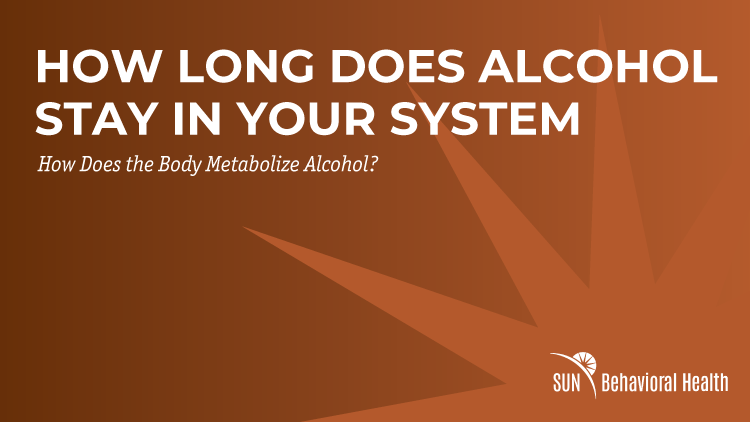Services
- Home
- Mental Health Services
- Who We Treat
- How We Treat
- Patients & Visitors
- About
close

Alcohol can make us do crazy things. Thinking we are a pop star at karaoke, giving embarrassing speeches at weddings or company parties, and flirting with people we wouldn’t normally even talk to can all happen when too much alcohol is involved. Alcohol lowers inhibitions and makes everything sound like a good idea. But what happens when those decisions turn reckless? Deciding to drive with too much alcohol in your system is dangerous and life-threatening to not just yourself.
Between 2016-2020, 32.1% of driving deaths in Harris County involved alcohol. This was higher than the state of Texas and the United States averages. Here at SUN Behavioral Houston, it is our mission to educate our communities about the effects of alcohol. Today, we are discussing how long alcohol stays in your system and what you need to know before making important decisions.
A standard drink is one of the following:
This is according to the National Institute on Alcohol Abuse and Alcoholism (NIAAA). Each of these drinks contains approximately 14 grams of pure alcohol. While certain variations of alcohol may have higher or lower concentrations, this is the standard system used.
Heavy drinking is defined as 15 or more drinks in a week for men and 8 or more drinks in a week for women. Those who partake in heavy drinking may begin experiencing the signs of an alcohol use disorder.
Alcohol enters the bloodstream through the linings of the mouth, stomach, and small intestines. The bloodstream distributes it throughout the body, affecting the brain and lungs before heading to the kidneys and liver. Alcohol’s full effects can be felt in around 30 minutes. The main areas of the brain that are affected are the hippocampus and the cerebellum. These regions are responsible for memory and coordination, so falls and blackouts occur after drinking too much.
When alcohol reaches the liver, the detoxification process occurs. The liver will break down alcohol from ethanol to an enzyme called alcohol dehydrogenase (ADH). ADH then converts alcohol into acetaldehyde. Lastly, with the help of the enzyme aldehyde dehydrogenase, it is turned into acetate. Acetate turns into carbon dioxide and water with the help of other tissues and leaves the body through urination and sweat.
That process sounds easy and painless, right? Actually, acetaldehyde is a known carcinogen and very harmful to the body. While its lifespan is short within the liver, constant consumption of alcohol creates more of a presence of acetaldehyde. Also, the liver can on average process one standard drink per hour. By overwhelming the body with alcohol, acetaldehyde increases in the liver. This is where liver cancer and cirrhosis come from.

Not everyone will process alcohol the same way. There are some people who have alcohol intolerance, meaning their bodies take much longer to process alcohol than average. Some other factors include:
Weight: those with higher body fat percentages will have a higher BAC than those with lower fat percentages. Excess alcohol is stored in fat before being processed in the liver.
Medications: certain medications – such as anxiety medications or antidepressants – can amplify the effects of alcohol or can cause negative effects such as increased depression and anxiety.
Gender: females do not produce as much ADH as males. This means it takes the liver longer to process alcohol.
Food intake: eating before drinking is always a good idea. Alcohol is absorbed mostly through the stomach lining. Having food in the stomach can slow how much alcohol is absorbed.
Consumption rate: the faster you drink, the longer it will take for the body to process it.
There is no way to speed up the process of alcohol digestion. No amount of coffee, cold showers, or walks will make the body metabolize alcohol faster. Hydrating will help the body heal, but it will not increase the rate the liver detoxifies.
Blood alcohol content (BAC) is the measurement system for alcohol in the body. It can be measured through the blood or through the lungs using a breathalyzer. The measurement is per 100 mL of blood, meaning a BAC of .12 means there is .12% alcohol by volume within the blood. For measuring breath, the ratio to blood alcohol is 2100:1, meaning a breathalyzer measures as grams per 210 Liters of breath.
The average urine test can detect alcohol for 12 hours. There are advanced tests that can detect alcohol 24 to 48 hours after consumption. The presence of alcohol metabolites will signify a positive test result.
Alcohol can be detected in hair follicles up to 90 days after consumption. A hair test cannot determine a specific BAC, they can only detect that alcohol has been consumed within a 90-day time.
Saliva tests can detect alcohol 12-24 hours after drinking. While saliva tests are not used very often, they can be administered if another substance is suspected that was taken orally.
Alcohol can be detected in breast milk 30 to 60 minutes after the first drink. The BAC of the mother will be the same for the breast milk, because it is being produced with the alcohol present in the bloodstream. It is better to have extra milk on hand if you plan to drink.
Alcoholism – better known as alcohol use disorder (AUD) – is a term used for someone who has an unhealthy relationship with alcohol. This will look different for everyone, and depending on what stage of alcoholism the person is in, the physical and mental effects will vary.
This is not to say that having a few nights of blacking out means you have an AUD. When alcohol begins to affect your life - whether through physical health, job performance, or relationships - it is time to ask yourself if your relationship with alcohol is too much.
For anyone who has experienced alcohol poisoning, this can be the final sign that alcohol has become an issue. Alcohol poisoning can occur when BAC reaches over .16, and can lead to severe impairment. If you or someone you love has been treated for alcohol poisoning, especially more than once, finding treatment for AUD can be life-saving.

When it comes to finding treatment for alcohol use disorder, having everything in one place can make it comfortable and easy. From alcohol detox to inpatient and outpatient services, SUN Behavioral Health Houston provides a safe environment with a knowledgeable and compassionate staff. Our team meets with each individual patient to decide what treatment plan is right for them. Services include:
Alcohol Detox: Detoxing helps the body readjust to not having alcohol in the system. When alcohol is consumed on a regular basis, the brain and other organs become used to it. When alcohol is taken away, it can take time for the body to recover, but this process is very important to healing and long-term recovery. Alcohol withdrawal is one of the main reasons patients keep using. Our detox program is medically supervised, and our staff is also trained in prescribing medication to help alleviate withdrawal symptoms.
Inpatient: Our patients stay at our facility 24/7 and participate in group and individual therapy. We create an individualized treatment course that can include dual diagnosis with mental health conditions as well as wellness techniques to create healthy habits. This provides a safe and distraction-free space for our patients to focus on themselves and recovery.
Outpatient: For our patients transitioning out of inpatient care or for those who do not need as much support as an inpatient stay. Patients come to our facility for therapy and support throughout the day, 5 days a week. They do not stay onsite overnight; they are free to go home and then come back the next day.
If you or someone you love is managing an alcohol use disorder, there is no need to feel alone. SUN Behavioral Health Houston provides a safe space and effective treatment options that promote support. Call us today at 713-796-2273 to learn more about how we can help you reclaim your life from alcohol.
It takes on average one hour to process one standard drink of alcohol. Therefore, depending on how many drinks you consume will determine how long alcohol stays in your body. Alcohol can be detected 12 to 24 hours after the last drink.
One hour for every one drink. If you ever doubt your ability to drive, get a ride instead. It is always better to be safe.
There is no way to make BAC drop faster. Eating and hydrating can make you feel better, but your BAC can still remain high depending on how much alcohol was consumed.